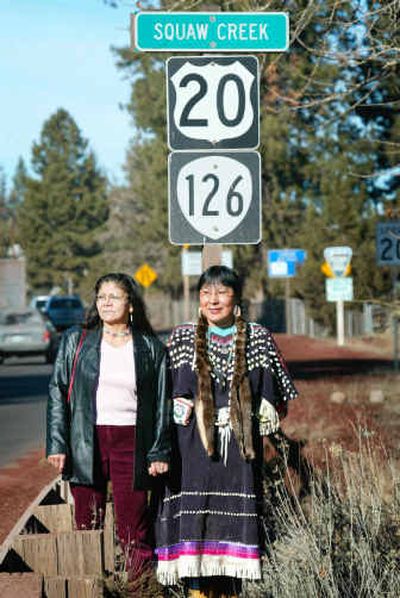Purging ‘squaw’ from map proves a long process

SISTERS, Ore. – The white children called her “Pocahontas.” They called her a dumb Indian.
When they wanted to dig in, they called her “squaw” – a derogatory word for an American Indian woman and one that Olivia Wallulatum, 50, has spent much of her adulthood trying to forget.
It’s especially hard to forget in Oregon, which according to the U.S. Geographical Names Board has more rivers, buttes, meadows, mountains and gulches named “squaw” than any other state in the nation.
There are at least 170 natural features named Squaw here and 893 nationwide – and while tribal and government officials from coast to coast agree the word needs to go, their efforts to eradicate it from the U.S. map have met obstacles. In Oregon, many of the delays stem from disagreements among the tribes on the new names.
On a recent winter morning, Wallulatum crouched to touch the Squaw River running along the highway, along land her ancestors from one of Oregon’s largest tribes ceded to white settlers. “This is a reminder,” she said, her long black braids wrapped in otter skin, as she looked at the green Squaw River sign, then quickly looked away.
“There are 170 visual reminders out there of that negativity,” she said.
In 2001, Oregon joined five other states, including Minnesota, Montana, Maine, Oklahoma and South Dakota, in requiring that the word “squaw” be deleted from state maps.
Lawmakers set a deadline that came and went last month – and although six of the original Squaw names in Oregon have successfully been changed, the majority remain.
In the decade since the first of the state laws went into effect in 1995, only 74 Squaw place names of the original 967 across the nation have been changed – less than 8 percent of the total, said Roger Payne, executive secretary of the U.S. Geographic Names Board.
“The reason is pretty much this – there’s really no one word to which everyone agrees it can be changed,” said Payne, citing a survey of American Indian tribes conducted by the board which showed that although the majority wanted the squaw name to go, few were in favor of changing it to a single alternative. Instead, they each wanted a word from their specific language, to preserve their cultural heritage.
In contrast, the U.S. Geographic Names board voted to universally replace derogatory references to blacks in 1963, and in 1974 did the same for land features that used a derogatory word for Japanese. Those changes were made within a year of the decision.
Oregon has no quick fix.
“Consensus takes time,” said Senate Majority Leader Kate Brown, D-Portland, who was one of the original sponsors of the 2001 bill. She now supports a second piece of legislation that would give the tribes an extension.
After three years of internal debate, the Confederated Tribes of the Warm Springs passed a resolution in 2004 approving a total of 42 possible words to replace “squaw” on the tribe’s ancestral land in Oregon. The list consists of 15 words translated into the Wasco, Paiute and Sahaptin languages, the three languages spoken by the three distinct Warm Springs bands, which have been living together under one tribal roof since 1879.
But the list was unmanageable, said officials with the Oregon Geographic Names Board. And many of the proposed names are not easily pronounceable by English speakers, like “ixwutxp,” meaning “blackberry” in Wasco.
“What happens if somebody calls up and says there’s a fire on x’s and y’s island? You need something that a normal citizen can recognize. They need to be able to call 911 and say, ‘We’re here,’ ” said Lewis McArthur, a member of the Oregon Geographic Names Board and the author of the largest survey of geographic names in the state.
For their part, the board says they need the tribes – or else another community group – to propose a word for each specific Squaw feature and stick with it through the approval process.
The controversy over the word erupted in 1992, following a television appearance by Suzan Harjo, a writer and noted American Indian activist. She said the slur comes from a Mohawk word for female genitalia – an inflammatory etymology which has since become accepted by many tribal groups.
While the two words sound similar, linguists say they are not related.
“Squaw” is a Massachusett word meaning “woman” and was used as early as 1663 in a translation of the Bible to mean just that, said Ives Goddard, a senior linguist at the Smithsonian Institution.
Regardless of the word’s origin, experts agree the word has become derogatory. “Nobody sensitive would use it,” Goddard said. “As we know, lots of words are considered offensive that have perfectly innocent etymologies.”